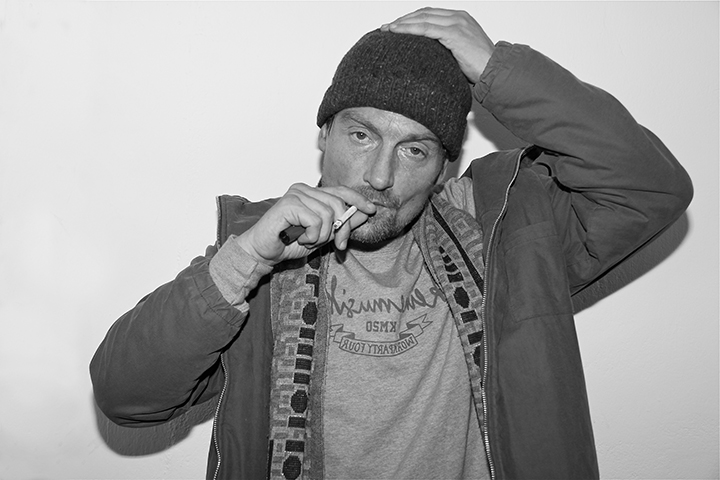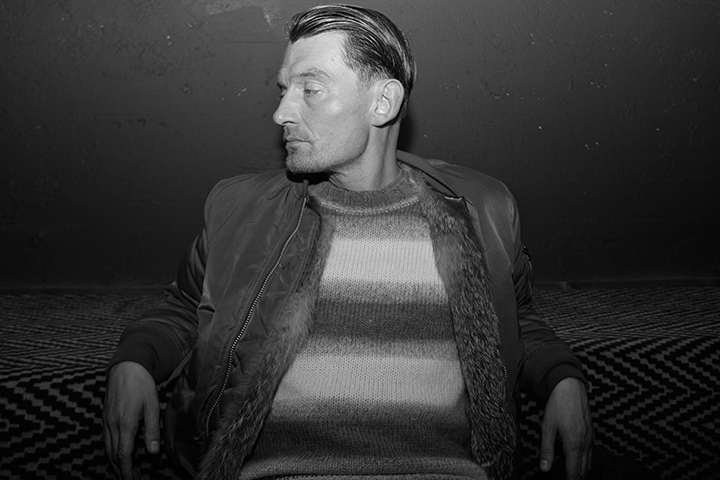Maximilian Becker met Fetisch in Hamburg and Zürich for an interview. In both conversations the Berliner spoke of founding Terranova, current projects and his time in New York.
Maximilian Becker What was the impetus for your last album, Hotel Amour?
DJ Fetisch When I was in Paris, Michael Meyer from Kompakt called me, because he heard a bootleg of mine on the internet. We then wanted the name “Terranova” to revive the concept. At the time I also wanted to do something with changing guests, since the other bands I was in had fixed formations. Except for &Me, Terranova doesn’t have permanent members. That’s why we could work with so many guests on the current album, like Nicolette Krebitz, Kahn, Tomas Høffding [of WhoMadeWho] and Udo Kier.
MB I have the impression that some of Terranova’s tracks are pretty dark, musically and lyrically. Is that part of the band’s DNA?
DF I do think there’s a kind of Terranova DNA. But it can be better assessed by an outsider. I think it’s part of the nature of things that some things
MB How should the name “Terranova” be understood? Did you want to suggest with the project, as the name does, forging new musical territory?
DF First I made the music and then I chose the name. At the time the project was called “Turntable Terranova”; it began with two EPs on Compost Records from Munich. In the mid-’90s in Germany everything was very uniform. On the one side you had techno, on the other hip hop. At the time we didn’t feel like we belonged to either side, we just played what we liked. You can hear this on the DJ-Kicks album, which is from this time.
MB When you listen to the debut album from 1999, Close the Door, where hip hop is clearly cited, and the club-ready Hotel Amour from 2012, the stylistic differences are huge.
I wanted to make something that had more arrangements, vocals, structure and samples, which also came partly from hip hop culture and wasn’t there in techno. Chicago house was also an influence back then, and I also listened to a lot of blues, reggae and electronica. Those were all things that weren’t played in Berlin and Europe. Terranova
DF I don’t think so. There are always people who tell me that they can hear there’s only one mind behind the music. Between the hip hop-heavy tracks I always also made house records. My first record, by the way, was house. I released it in England in 1989 together with the Stero MCs. At the time I just took the liberty to make what I felt like and sampled things, layered them over something else and mixed them anew. That’s how the sound of Close the Door came about. I was also in New York a lot at that time and heard the house that was playing there, which in Europe we didn’t have at all at this scale — we only had acid house and techno. From Germany I only knew the sound of Tresor, which was very brutal and didn’t really speak to me at the time. I wanted to make something that had more arrangements, vocals, structure and samples, which also came partly from hip hop culture and wasn’t there in techno. Chicago house was also an influence back then, and I also listened to a lot of blues, reggae and electronica. Those were all things that weren’t played in Berlin and Europe.
MB Let’s talk about current trends!
DF I have no idea if there’s a current trend. At the moment I’m not taking anything new in that’s exciting — techno and house, after all, aren’t new any more. Yet within these genres there are always great new tracks which I regularly play. I would even say that 90 percent of what I play is new. If that wasn’t the case and I wasn’t always making these new discoveries I wouldn’t enjoy deejaying anymore. But that’s not the case. Actually, current music has a lot to offer. Despite all this the I find the Zeitgeist confusing, so I live in a kind of parallel world. I honestly can’t imagine a life other than in clubs and the studio.
MB What is the main difference between the time you’ve just described and today?
DF It seems to me that, in comparison to earlier, the years are becoming more arbitrary. In my eyes 2007 isn’t so different from 2012. I don’t need a boarding card for the plane and I can do more with a computer, but this isn’t a revolution to me. I think there were times when a year could clearly be delineated by its music, fashion and the whole aesthetic that went along with it, simply because so much happened. A lot of people will say that this has to do with one’s own youth, but that’s not true, because today is so wrapped up in and influenced by the past. New York, for example, hasn’t changed that much: There are still lines at the toilets where drugs are taken, pumping sound systems, worked up young people — Paradise Garage and Sound Factory or now Panorama Bar in Berlin, on a lot of levels they’re not so far apart from one another. I don’t necessarily mean that negatively. In contrast: I find it great, because I can keep doing my thing until I collapse. I’m not worried that suddenly everyone will only want to hear twelve-tone music.
MB Tell us more about your time in the ’80s in New York!
DF It began with disco, Studio 54 and the gay underground of New York and San Francisco. They were clubs like the Fun House, Mad, Danceteria, Roxy and later Tunnel and Palladium. Luckily I also experienced the beginning of acid house and all the raves in London — the summer of love. The mixture of these movements from New York and later England is actually what’s happening now, has been made into an industry.
MB What was the club vibe at the time and how did you break into the scene?
In comparison to the scene in Germany, I was fascinated at the time that in New York the division between hip hop and techno didn’t exist. Terranova
DF For people who listened to this music or deejayed themselves, the clubs I listed were the most important in New York. If you came into contact with one of the hosts or deejayed yourself you automatically knew where something was happening. As to the mood, everything then was very free, which naturally fascinated me. People experimented without taboos and genre conventions with music, sounds and styles. It gave everything in the clubs a very wide spectrum. There were also musicians who didn’t actually know very much but had reached a very exciting sound. In comparison to the scene in Germany, I was fascinated at the time that in New York the division between hip hop and techno didn’t exist. This attitude has been carried over to the public, or better said, the music and the public have mutually benefitted each other. That’s when things we’re familiar with today — excessive partying with wild disco outfits, party drugs, the gay underground — all began.
MB In London and New York you also met artists like the Stereo MCs, Tricky, Madonna…
DF Those were all artists who were still young and unknown at the time. They hung around the same clubs and sometimes deejayed or played before or after me. It wasn’t anything special. You simply hung out, talked about music, the scene and friends in common. When it fit, sometimes you later went into the studio together. There’s even a flyer still, with my name on it and Madonna as the supporting act — I was the main act. Jean-Michel Basquiat and Andy Warhol were always out then and occasionally met in the clubs. That’s how it was then in New York.
MB How would you assess these movements in relation to the present?
DF Sometimes I have the impression that you can’t tell the difference between music in the supermarket and in a club anymore. Everything is identified by its commercial quality, exhausted and then processed. On the one hand people are sitting there with their hearts and souls, forgoing a high standard of living, concerned more about the matter at hand. On the other side are the producers who manufacture pop music and simply take others’ ideas for their products. Sometimes you can even hear this, it’s so obvious. I find this change upsetting. In the past any type of elevator music played in the hotel foyer. Now a compilation from a DJ will be played, or even mixed live.
MB What do you see as consequences of this change?
DF You could say that everyone listens to house music. When I deejay in Panorama Bar, I see brilliant tourists and brilliant locals and they party for an evening together and have a great time. And exactly that can happen a few days later in England. I look around, however, and see really very conservative people, the kind you earlier wouldn’t have had anything to do with, but who completely flip out to the music. What I want to say is: I think that right now everything is very linked and the differences between codes are minimal. Clear signals of affiliation are becoming less and less clear. This made up a big part of pop culture and it’s just no longer there. Back then we had Elvis Presley in a golden jacket, the Rolling Stones in paisley, and later the whole disco style. That’s over. Today everyone from bank employees to skaters wear the same sneakers and listen to the same music.

